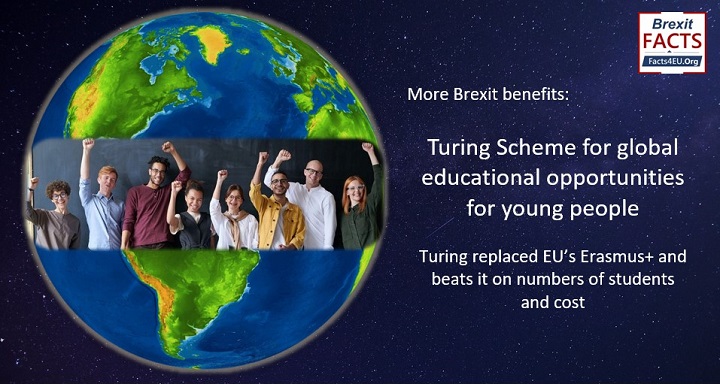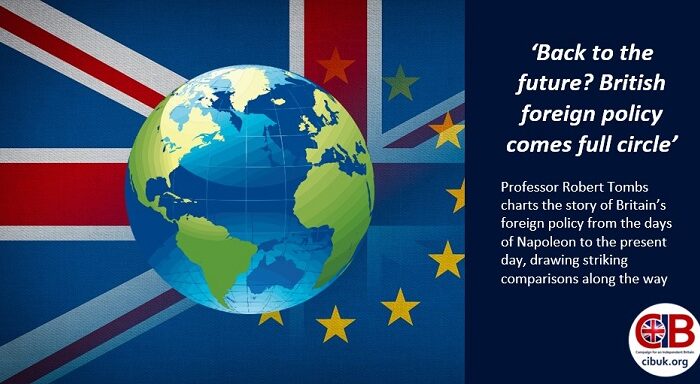More Brexit benefits: 3 times as many students use UK’s Turing than used EU’s Erasmus

Turing replaced EU’s Erasmus+
and beats it on numbers and cost
We present the final report in our three-parter on higher education exchanges
On Saturday 15 July 2023, the Dept for Education published its latest statement on the success of the Government’s Turing Scheme which has replaced the EU’s highly-expensive and little-used Erasmus+ programme. The results have been astonishingly good so far.
A CIBUK and Brexit Facts4EU three-parter on opportunities for overseas study post-Brexit
Part One : The facts about Erasmus+
Part Two : Brexit Britain’s new student programme set out to beat EU’s by over 50% in year one
Part Three : Latest update on Turing Scheme in 2023 – UK’s global alternative to EU’s Erasmus+ (This report)
The transition from the EU’s Erasmus+ to Turing
Because of the forward planning involved in overseas placements of young people, some continued to participate in Erasmus+ after Brexit. The UK’s new Turing scheme made its first placements in the academic year 2021-2022.
This report looks at the first two years of the Turing Scheme. We have analysed the numbers of university students, as well as those on vocational programmes and also school pupils. Our primary focus, though, is on university and higher education students, as this is the area which was most criticised by Remainers prior to and after Brexit.
Note: We have used data from the UK’s Dept for Education as well as data from the EU Commission. In the latter’s case we drilled down into actual student numbers, as their headline figures include the vast numbers of academic staff from the UK who used Erasmus+. Proportionatey academics used it four times more than their students.
Summary
The dramatic success of the Turing Scheme for the UK’s young people
1. University and higher education students
- 2021-2022 : 28,997 students
[Source: Dept for Education.]
2. How this compares with the EU’s Erasmus+
- 2019 : 9,993 (in the final pre-Covid year when the UK was still an EU member)
[Source: EU Commission.]
 Note: Almost three times as many university and HE students used the UK’s new scheme, compared to the number that used the EU’s scheme.
Note: Almost three times as many university and HE students used the UK’s new scheme, compared to the number that used the EU’s scheme.
Click image to enlarge
© Brexit Facts4EU.Org 2023
3. All participants (2021-2022 data)
- Including further education and school pupils : 41,024
[Source: Dept for Education.]
4. Where are the UK’s higher education students going? (2021-2022 data)
- United States : 3,911
- China : 1,857
- Canada : 1,766
- Australia : 1,405
- France : 1,212
- Spain : 1,171
- Japan : 1,169
- Hong Kong : 1,012
- India : 1,002
- Germany : 933
[Source: Dept for Education.]
© Brexit Facts4EU.Org 2023 – click to enlarge
As can be seen, only three of the Top 10 most popular destinations are in the EU.
Commenting, Minister for Skills, Apprenticeships and Higher Education Robert Halfon said:

“Once again, this transformational scheme is extending the ladder of opportunity for more young people to experience other cultures and learn vital skills for life and work, regardless of their background.
“With nearly a 50% increase in the number of successful applications and around 1,800 additional learners from disadvantaged backgrounds in the FE sector compared to last year, I am delighted that this scheme is driving social mobility.
“Young people taking part will benefit from inspirational placements around the world that will build the confidence they need for their future, whilst bolstering the government’s ambition for a Global Britain.”
What does the EU have to say?
“The UK is no longer an EU Member State. It has also opted not to take part as an associated third country in the new Erasmus+ programme 2021-27. The UK will therefore not be taking part in the new programme as a Programme Country. The European Commission regrets this decision by the United Kingdom.”
Given that the list of the Top 10 universities in the world contains three from the UK and none from the EU, we are not surprised they ‘regret’ the UK’s decision.
Please support our work today if you can, to enable us to carry on:
Observations
Delivering Brexit benefits
Has the Government delivered for students with its new Turing Scheme post-Brexit? The answer is most definitely yes and they get top marks.
The numbers don’t lie and this scheme is clearly popular. It is also vastly less expensive than the EU’s Erasmus+ programme, which mostly benefited students from the EU – and UK academics.
Once again we have presented another Brexit benefit. Free to pursue a global agenda the Government has exploited its new-found freedoms, defied all the doom-mongers, and delivered a successful scheme at much lower cost and with a much bigger take-up from the UK’s young people.
Now if only it could do this across all government departments…
Turing – a British hero
Alan Turing invented the world’s first stored-programme computer and used it at Bletchley Park to decode the supposedly unbreakable German Enigma machine, enabling all Germany’s secret communications to be unencrypted, thereby shortening the war.
We think he would have been proud of the scheme for young people to broaden their minds, which now bears his name.
The Brexit Facts4EU.Org article can be found here.
Main image: Montage © Facts4EU.Org 2023






